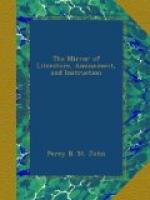* * * * *
THE ARBALEST, OR CROSS-BOW.
(To the Editor.)
No. 538, of The Mirror, contains a very interesting memoir on the subject of the Cross-bow, but I do not find that the mode of bending the steel bow has been described; which from its great strength it is evident could not be accomplished without the assistance of some mechanical power. This in the more modern bows is attained by the application of a piece of steel, which lies along the front of the stem, and is moved forward on a pivot until the string is caught by a hook, and a lever is thus obtained, by means of which the bow is drawn to its proper extent. It seems to me that this is the description of bow of which your correspondent has furnished a drawing. Another mode, and which appears to have been applied to the ancient bows, was by a sort of two-handed windlass, with ropes and pulleys, called a "moulinet,” which was temporarily attached to the butt-end of the Cross-bow; of this a drawing is given in the illustrations of Froissart’s Chronicles, particularly in that one descriptive of the Siege of Aubenton; in which two bowmen are shown, one in the act of winding up the bow, and the other taking his aim, the moulinet, &c. lying at his feet. Of this latter description, there are two specimens preserved in the Tower of London, both of about the period of our Henry the Sixth.
C.P.C.
* * * * *
LINES TO A LARK.
(For the Mirror.)
Upon thy happy flight to heaven, again,
sweet
bird, thou art;
The morning beam is on thy wings, its
influence
in thy heart;
Like matin hymns blest spirits sing in
yonder
happy sky,
Break on the ear, the small, sweet notes
of thy
wild melody.
Cold winter winds are far away, the cruel
snows
have past;
And spring’s sweet skies, and blushing
flowers
shine o’er the world
at last;
Where the young corn springs fresh, and
green,
sweet flowerets gather’d
he,
And form around thy lowly nest a shelter
sweet
for thee.
Is it not this which wakes thy song, with
thoughts of
summer hours,
When warmer hues shall clothe the skies,
and
darker shades the bowers;
Has nature to thy throbbing heart such
glowing
feelings given,
That thou canst feel the beautiful, of
this bright
earth and heaven.
If so, how blest must be thy lot, from
azure
skies to gaze,
When the fresh morn is in the heavens,
or
mid-day splendours blaze;
Or when the sunset’s canopy of golden
light is
spread,
And thou unseen, enshrin’d in light,
art singing
overhead.
Oh then thy happy song comes down upon
the
glowing breast,
Soft as rich sunlight, on the flowers,
comes from
the golden west:
And fain the heart would soar with thee,
enshrin’d
in thought as sweet,
As the rich tones, which from thy heart,
thou
dost in song repeat.




